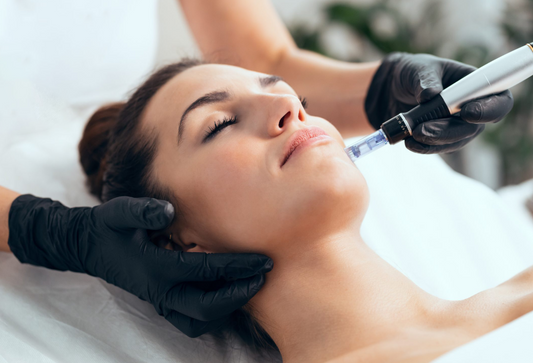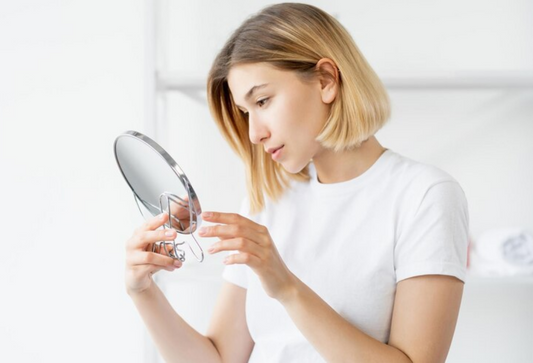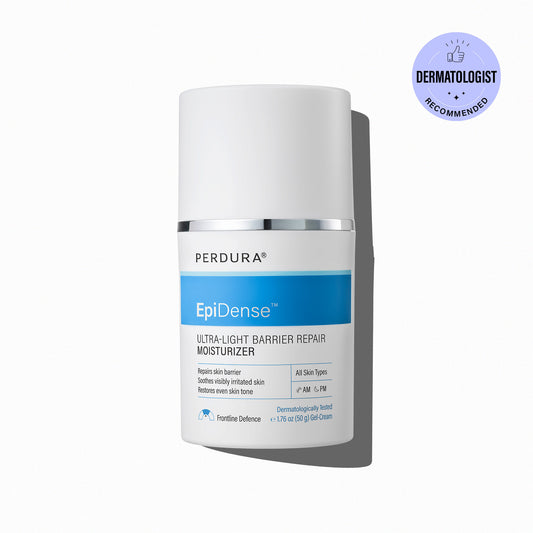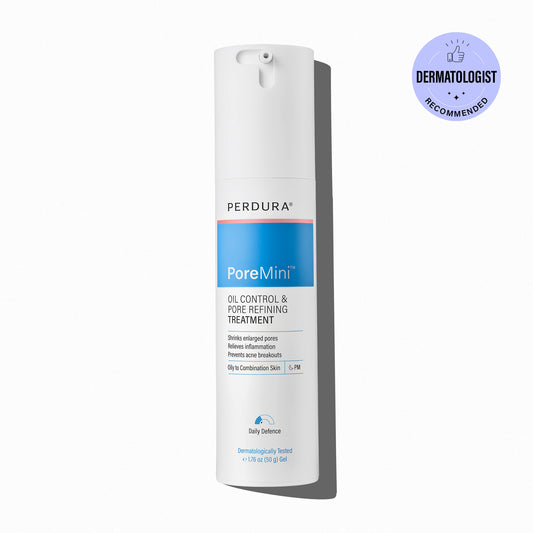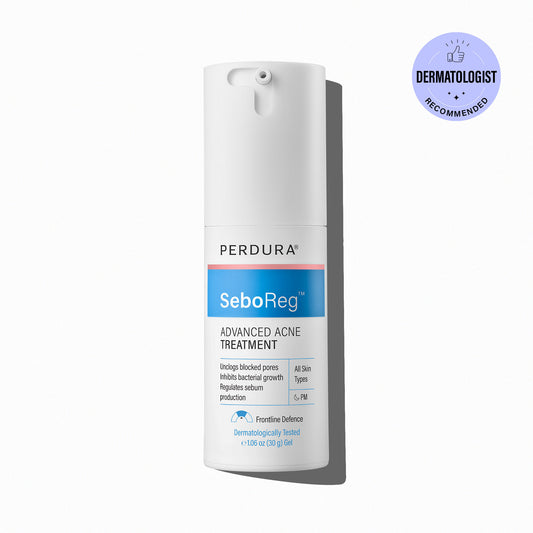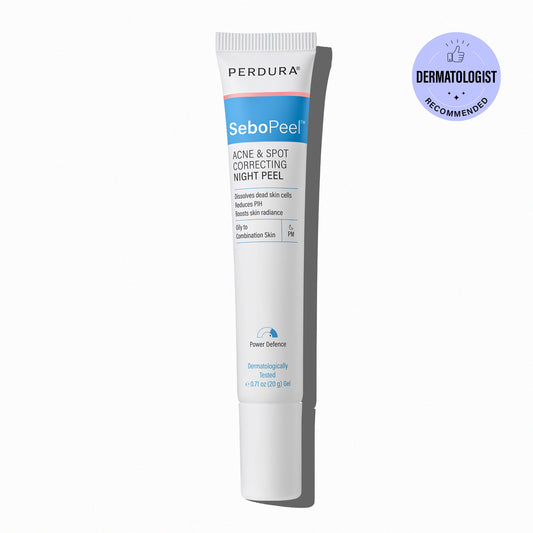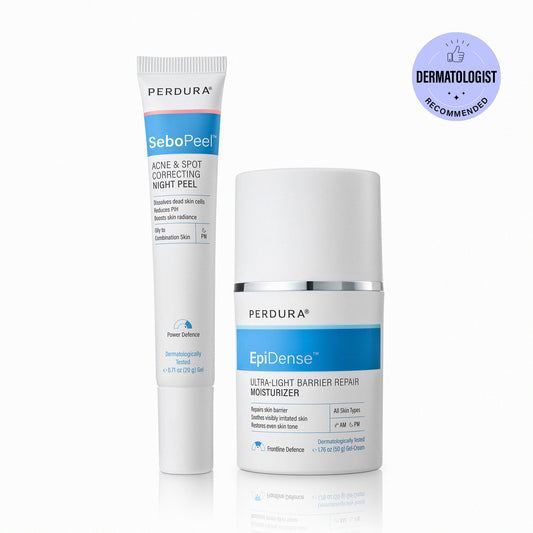Introduction
Do this, don't do that – there are so many tips out there, and everyone has an opinion. But instead of diving into complicated solutions for acne-prone skin, why not start with simple changes that can make a big impact? It's surprising how seemingly small habits can actually harm your skin.
Learn about the different stages of acne and how to manage each one in our detailed look at Understanding the Acne Lifecycle.
Let’s dive deeper into these habits and learn what you can do instead to tackle your acne-prone skin!
Habit 1: Over-Washing Your Face
Washing your face too often can strip your skin of natural oils, leading to increased oil production and more breakouts. Overwashing can also cause dryness and irritation, making your skin susceptible to acne.
What to Do Instead: Cleanse your face twice daily with a mild, non-comedogenic cleanser.
Habit 2: Using Harsh Exfoliants
Harsh scrubs can irritate and damage your skin, exacerbating acne. Physical exfoliants with large, rough particles can create micro-tears in the skin, leading to inflammation and breakouts.
What to Do Instead: Choose chemical exfoliants like salicylic or glycolic acid and use them 1-2 times a week.
Need an exfoliating solution for oily or combination skin? SeboPeel Exfoliating Gel reduces hyperpigmentation and enhances skin radiance.
Habit 3: Picking or Squeezing Pimples
Picking at your skin can introduce bacteria and lead to scarring. Squeezing pimples can push bacteria deeper into the skin, causing more severe infections and prolonged healing time.
What to Do Instead: Use spot treatments with benzoyl peroxide or salicylic acid and resist the urge to pick. A warm compress can also help reduce inflammation and speed up healing.
Looking for an effective acne treatment for all skin types? Try SeboReg Acne Control Gel to unclog pores, inhibit bacterial growth, and regulate sebum production.
Habit 4: Skipping Moisturizer
Not moisturising can leave your skin dehydrated, prompting it to produce more oil - one of the leading causes of acne-prone skin. This can create a vicious cycle where the skin becomes oilier and more prone to breakouts.
What to Do Instead: Use a lightweight, oil-free moisturiser to hydrate your skin.
Want to repair and soothe your skin without worrying about breakouts? EpiDense Moisturizer is perfect for all skin types, helping to restore an even skin tone.
Habit 5: Using Comedogenic Products
Products with comedogenic ingredients can clog pores and cause breakouts. Even products labelled as “natural” or “organic” can contain oils and ingredients that exacerbate acne.
What to Do Instead: Choose non-comedogenic skincare and makeup products.
Habit 6: Not Removing Makeup Properly
Sleeping with makeup on can clog pores and lead to breakouts. Makeup can trap dirt and oil in your pores, creating an environment for acne to develop overnight.
What to Do Instead: Remove all makeup thoroughly every night with a gentle makeup remover and follow with a cleanser. Double cleansing can ensure all residues are removed, keeping your skin clean and clear.
Habit 7: Overloading on Acne Treatments
Using too many acne products can irritate your skin and make acne worse. Combining multiple treatments can cause excessive dryness, redness, and peeling, compromising your skin’s barrier.
What to Do Instead: Stick to a simple routine with one or two targeted treatments and give them time to work. Patience is key; allow at least 4-6 weeks to see the effects of a new treatment.
Find out the unexpected causes of acne and how to avoid them in our blog on 5 Surprising Acne Triggers.
Habit 8: Ignoring Your Diet
Certain foods, like those high in sugar or dairy, can trigger breakouts.
What to Do Instead: Maintain a balanced diet of fruits, vegetables, and whole grains, and monitor any food-related breakouts. A food diary can help identify which foods might contribute to your acne.
Habit 9: Not Washing Your Pillowcase Regularly
Dirty pillowcases can harbour bacteria and oil that transfer to your skin.
What to Do Instead: Wash your pillowcase at least once a week to keep it clean. Consider using a silk pillowcase, which can reduce friction and irritation on your skin.
Habit 10: Stressing Out
Stress can trigger hormonal changes that lead to breakouts. Chronic stress increases cortisol levels, which can increase oil production and inflammation in the skin
Struggling with hormonal breakouts? Uncover the truth in our comprehensive guide to Hormonal Acne.
What to Do Instead: Practice stress-management techniques like exercise, meditation, or hobbies you enjoy.
Bonus Tip: Follow the Right Skincare Routine for Acne-Prone Skin
Establishing and sticking to the right skincare routine can help you manage breakouts, especially if you have acne-prone skin.
Consistency is key! Start with a gentle cleanser to remove dirt and excess oil without stripping your skin. Incorporate a non-comedogenic moisturiser to keep your skin hydrated and balanced. Use targeted treatments like benzoyl peroxide or salicylic acid to address breakouts, and always apply sunscreen during the day to protect your skin from harmful UV rays.
Remember, the best routines are tailored to your specific skin needs and adjusted as your skin evolves.
For a comprehensive guide on identifying acne-prone skin and creating the perfect skincare routine, check out our previous blog post: Acne-Prone Skin? Here’s How to Identify and Create the Right Routine.

Wrapping up!
Improving your acne-prone skin doesn't have to be complicated. By avoiding these common skincare mistakes and adopting healthier habits, you can make a big difference in your skin's health and appearance. Remember, small changes can lead to significant improvements over time.
Check out the rest of our blogs for more tips and tricks for managing acne-prone skin. Explore Perdura's range of products for innovative solutions tailored to your skincare needs.
Key Takeaway
- Avoid Over-Washing Your Face: Cleanse twice daily to prevent stripping natural oils and causing breakouts.
- Use Gentle Exfoliants: Opt for chemical exfoliants like salicylic or glycolic acid to avoid irritation and inflammation.
- Moisturize Properly: Use a lightweight, oil-free moisturiser to keep skin hydrated without clogging pores.
- Remove Makeup Thoroughly: Ensure all makeup is removed every night to prevent clogged pores and breakouts.
- Manage Stress: Practice stress-reduction techniques to balance hormones and reduce acne flare-ups.

